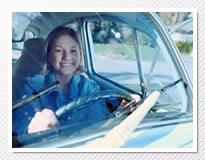FAQs about Teen Driver Safety
What is the goal of the Partners for Safe Teen Driving program?
Partners for Safe Teen Driving aims to reduce the number of car crashes and save lives of teenagers driving on Virginia's roadways through education and awareness of risky driving behavior. The program targets parents, educators, businesses, and law enforcement as key players in influencing teens to drive safely and responsibly.
From the Virginia Department of Motor Vehicles
Teen Driver Safety Frequently Asked Questions
Why is so much attention focused on teen drivers?
The risk of death from motor vehicles crashes is higher for 16- to 19-year-olds than any other age group. Although teens think it might be drug overdoses or suicides, crashes are a leading cause of death for U.S. teens, according to the Centers for Disease Control. And the Insurance Institute for Highway Safety reports that drivers ages 16 to 19, per mile driven, are three times more likely to be in a deadly crash than drivers 20 and older.
Are there special driving laws in Virginia that apply to teens only? Why?
Virginia’s teen driving laws were enacted to help keep teen drivers safe on our roadways. Since studies show inexperience, having multiple teen passengers and using a mobile phone are some of the reasons why teens are injured and die in crashes, laws restricting these unsafe behaviors are in place to protect new drivers.
What happens if I drink and drive?
Virginia has a zero tolerance law for those under age 21 who drink and drive. If you are convicted of driving after illegally consuming alcohol, the penalty includes losing your driving privilege for one year, and a minimum mandatory fine of $500, or 50 hours of community service.
Why do teen drivers crash and die more often?
According to the National Highway Traffic Safety Administration and Centers for Disease Control, young drivers underestimate dangerous situations, don’t recognize hazards, and they speed and tailgate more than experienced drivers. Studies show teen drivers who die in crashes are speeding, drinking alcohol, driving aggressively and recklessly, and not wearing a seat belt.
Is it really a big deal if I drive when I’m a little tired?
Drowsy driving is a serious danger and is one of the leading causes of teen crashes, according to the Centers for Disease Control. Teens need nine hours of sleep. If this requirement isn’t possible because of school, athletics, academic activities, work or other obligations, make arrangements for a well-rested driver to provide transportation.
How can I make sure I stay safe during my teen driving years?
Those 18 and younger must hold a learner’s permit for nine months in Virginia before getting a permanent driver’s license, so be sure to practice a lot with a licensed driver at least 21 years of age seated beside you. In fact, a parent or guardian must sign a form at Virginia DMV certifying that you practiced driving for at least 45 hours, 15 of which must have been at night. After getting your driver’s license, follow Virginia’s teen driving laws. Use common sense – obey the speed limit, drive sober, always buckle up and focus on driving, not on your phone or anything else.
CLICK HERE for safe teen driving tips from the Virginia Department of Motor Vehicles.
